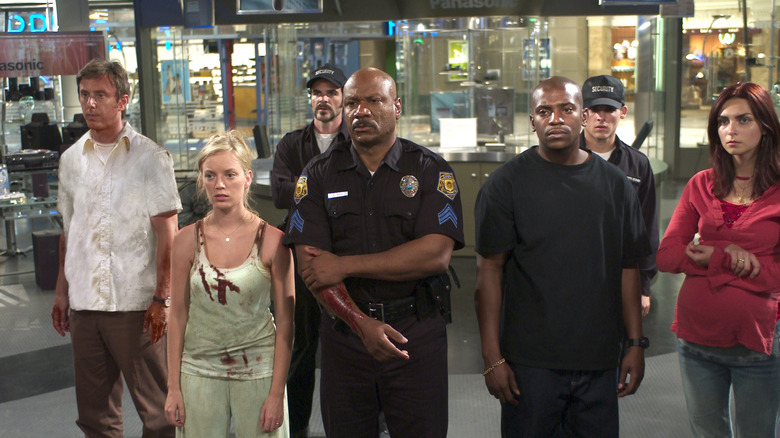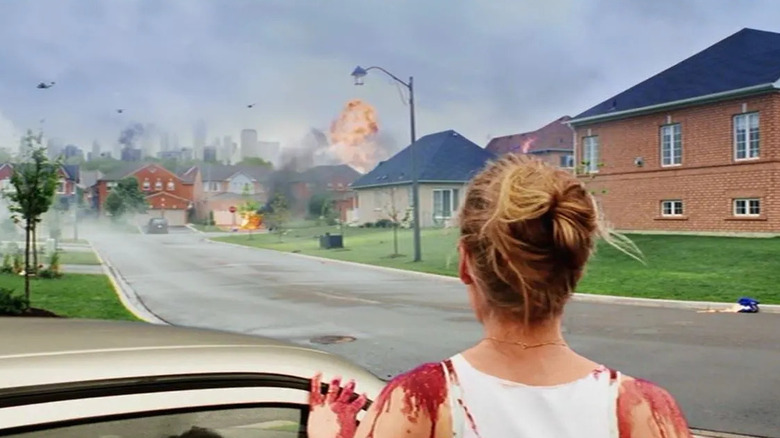
When Zack Snyder's "Dawn of the Dead" dropped in 2004, it earned scrutiny and praise alike. As a loose re-imagining of George A. Romero's 1978 zombie classic, it was evaluated against the original "Dawn of the Dead." Fans noticed the difference immediately; whereas the Godfather of Horror set his apocalypse survivors in a mall as a commentary on consumerism, Snyder's mall was one great, glossy epicenter for action sequences. Proponents of Snyder's movie, like /Film's Joshua Meyer, hailed said sequences like its famous cold open as the best possible use of Snyder's music video experience, whereas Romero would tell Simon Pegg in 2005 (re: Snyder's remake), "The first 15, 20 minutes were terrific, but it sort of lost its reason for being. It was more of a video game."
For screenwriter and now-DC Studios co-head James Gunn, it's true that social commentary on consumerism wasn't at the forefront of his mind during the writing process. Instead, redemption is the word of the day. At a press junket for 2004's "Scooby-Doo 2: Monsters Unleashed" (which he wrote), Gunn elaborated:
"[...] I think that in the end, 'Dawn of the Dead' is about redemption because it's about a bunch of people who have lived certain lives, who have maybe not been the best people, and suddenly they have everything that they've used to define themselves: Their careers, their churches, their jobs, their families are stripped away. They're gone. They start at nothing and they have to become who they really are in the face of all that and some of the people are redeemed and end up becoming good people and some of them are not redeemed and they end up, you know, not redeemed. And that's what kind of drove me throughout the story, was it was a story about redemption."
A Foundation Of Love

For James Gunn, a graduate of Lloyd Kaufman's Troma with "Tromeo and Juliet" and "Scooby-Doo" under his belt, "Dawn of the Dead" didn't need to be a socially conscious horror film to get a scare or tug at the heartstrings. There's plenty of empathy to explore within the survivors, all of whom are thrown together in a tempest that reveals their true character (for better and for worse).
The audience's everyman, Michael Shaunessy (Jake Weber), establishes himself as level-headed, capable, and good at reading people, and eventually reveals that he's a TV salesman -- just a guy like anyone else struck by catastrophe. Ving Rhames' brawny, stoic Kenneth forges a long-distance friendship with gun store owner Andy (Bruce Bohne) that's easy to invest in emotionally, while a thorough redemption arc is given to the despicable mall cop CJ (played by a pre-"House of Cards" Michael Kelly). Throughout it all is a common thread of meaningful connection among disparate elements. It's something Gunn pointed out as a core theme of the movie, explaining:
"I also think that there's a lot about how people survive and what people turn to in the face of such tragedy. The tragedy in this case being flesh-eating zombies. And really it's a group coming together to work as a community who wouldn't otherwise work together. So there is that foundation of love, that basic message, within even 'Dawn of the Dead'"
The pivot paid off; "Dawn of the Dead" opened on March 19, 2004 and took a bite out of the box office with a remarkable $26.7 million debut, knocking "The Passion of the Christ" from its number one spot. Said Gunn, "Well, you could see a movie with one guy rising from the dead or you can see one with thousands."
Read this next: Horror Remakes That Are Better Than The Originals
The post Why James Gunn Ultimately Sees Dawn Of The Dead As A Movie About Redemption appeared first on /Film.
0 Comments